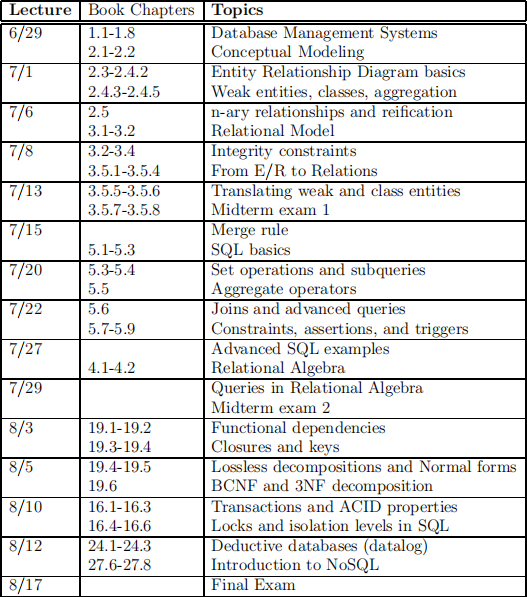CS 336 Principles of Information and Data Management
CS 336 Principles of Information and Data Management
Syllabus
Summer 2021
Course Schedule:
This course will be available on Sakai
https://sakai.rutgers.edu/portal
Asynchronous Lectures: Tuesdays, Thursdays
Lecture’s participation exercises due by 11:55pm on the day of the lecture.
Synchronous Recitations: Tuesdays, Thursdays 9pm-9:50pm
Instructor: Antonio Miranda-Garcia
email: [email protected]
Usually answered within 2 business days.
Office Hours:
Webex: TBD
Technology requirements:
• Phone camera or Scanner is required.
• Computer, tablet or phone is required.
• Fast internet connection is recommended.
Please visit the Rutgers Student Tech Guide page for resources available to all students. If you do not have the appropriate technology for financial reasons, please email Dean of Students [email protected] for assistance. If you are facing other financial hardships, please visit the Office of Financial Aid at https://financialaid.rutgers.edu/.
Course Goals: This course will consider various languages for representing and accessing the different kinds of information, methodologies for using them, theoretical principles underlying them, and some fundamental algorithms. However, in contrast to standard database courses, we will be very skimpy on implementation aspects of DBMS, such as data storage, and transaction processing, which are covered in 198:437.
Text: Database Management Systems by R. Ramakrishnan and M. Gehrke, 3rd edition, McGraw-Hill (ISBN:978-0072465631).
Students are responsible for knowing all the material (a lot) that will be covered in class and is NOT in the book.
Other useful books:
• A First Course in Databases by J. Ullman and J. Widom
• Database Systems: concepts, languages, and architectures by P. Atzeni, S. Ceri, S. Praboschi, R. Torlone
• Fundamentals of Database Systems by R. Elmasri and S. Navathe
Class Policy:
• Attendance. Watching all video-lectures during the scheduled time is required. The instructor assumes that all students have knowledge of every announcement made during the lectures as well as all material covered.
• Exams. The exams will include material from:
– lectures
– homeworks
– project
– class participation
There is NO pre-scheduled general makeup exam. A makeup exam may be given to specific in-dividuals only on the basis of a legitimate, documented conflict, or a university approved reason, or any other emergency that is deemed a legitimate reason for taking a makeup. Students are expected to attend all classes; if you expect to miss one or two classes, please use the University absence reporting website https://sims.rutgers.edu/ssra/ to indicate the date and reason for your absence. An email is automatically sent to me.
• Participation Exercises. At the end of each video lecture an exercise about the material covered in the lecture will be assigned. The participation exercise must be turned in through Sakai by 11:55pm of that same day. There is NO make-up for participation exercises but the lowest one will be dropped.
• Homeworks There will be five homeworks. They will be posted on Sakai. Late homeworks (less than 2 days) will still be accepted but with a 30% penalty even if they are 1 minute late. After 3 days late homeworks will NOT be accepted. You have plenty of time to work in each homework, and you are responsible for planning and managing your time. Your best strategy for working on homeworks is to start early, and hand in something at least a full day before the deadline. You can continue working on the homework and submit as many updated versions of your homework as you want before the deadline.
• Project. For the project you will work (remotely) in groups. The programming project will be graded principally on functionality. In order to pass the course, a working programming project must be completed and handed in. Individual contributions to the project will be measured and taken into account, the instructor may request an oral examination to further evaluate a student’s understanding of the material involved and the way in which the program works. The only communication between teams should concern very general topics such as how to log in, how to install software and the like. Reusing software written by others or for other courses/projects is prohibited, unless approved by the instructor/TA.
• Feedback. Given the special circumstances of everything being done remotely, it will take some time for the TAs or instructors to answer questions about the assignments. We will do our best to try to answer them as soon as possible but not receiving an answer on time should not be a reason for not turning in your assignment. Start working early so that if you have questions, there will be time for us to answer them.
• Regrading. You have one week after the grade of an exam, homework, project, or participation exercise is released to the class to request a regrade. After that period, the grade becomes permanent and cannot be changed. The grade of the final exam becomes permanent one week after it is released through Sakai.
• Grading.
The grade assigned as final grade cannot be changed, even by doing additional work. In order to be fair to all students, any option to improve grades (if any) will be given to every student, NOT just to one particular student.
• Academic Integrity.
We take academic integrity quite seriously. Copying answers from any source including pub-lished solutions is considered academic dishonesty as is posting and copying answers from services such as Chegg.
http://nbacademicintegrity.rutgers.edu/home-2/for-students/
Honor pledge:
All students will need to sign the Rutgers Honor Pledge on every major exam, assignment, or other assessment as follows:
On my honor, I have neither received nor given any unauthorized assistance on this examination (assignment, paper, quiz, etc.).
Course Outline:
Adjustments to this schedule, as well as to the order of the topics will be made as necessary.
Important Dates:
2021-07-06


